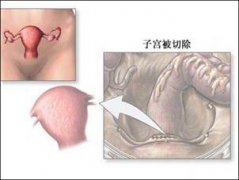Hysterectomy: what should you know before the surgery

A hysterectomy may be done to relieve symptoms caused by several conditions such as fibroids, endometriosis, hyperplasia, chronic pelvic pain and uterine prolapse. Like other operations, hysterectomy involves both risks and benefits. So if you decide to have a hysterectomy, make sure you understand all of your treatment options and the risks and benefits of each.
1. There are three types of hysterectomy
If you choose to have a hysterectomy, you may have to decide whether you wish to have a partial, total or radical one. With a partial hysterectomy, your uterus is removed while the cervix is reserved. With a total hysterectomy, your cervix is removed along with your uterus. With a radical hysterectomy, you will lose the uterus, cervix, upper vagina and parametrium. These decisions are usually made based on your medical history, your doctor's recommendations and your personal feelings.
2. You can still have sex after the surgery
How soon you can have sex after a hysterectomy depends on the types of hysterectomy: partial, total, or radical. Waiting two to four weeks to get back to sex is generally okay if your cervix was not removed along with your uterus. But if your cervix was removed, it takes about six weeks for the recovery of the vagina.
3. Removal of ovaries causes instant menopause
Your ovaries release the hormones that cause your period, so ovary removal (Oophorectomy) results in menopause. This means you will get all the symptoms that come along with menopause, including hot flashes, dry vagina, mood swings and an increased risk of osteoporosis.
4. Hysterectomies are not always necessary
Depending on the condition you are facing, you may be able to keep your uterus intact. Alternatives are out there for about 90 percent of hysterectomies surgeons do. Endometriosis, for example, can be treated with a herbal medicine called fuyan pill. According to the clinical stasis, following a strict diet plan, many endometriosis patients got a cure with this herbal medicine.
5. Hormone therapy could help with physical changes after surgery
If you have a hysterectomy that removes your ovaries, then you should talk about the pros and cons of estrogen therapy with your doctor. After the ovaries are removed, estrogen therapy can help relieve uncomfortable symptoms of menopause. However, oral hormone therapy carries increased risks of stroke, blood clots like deep vein thrombosis, and heart disease, so you should also discuss with your doctor.
Testimonials
- Adenomyosis with Ureaplasma Urealyticum Cured by Fuyan Pill
- Tubal blockage with hydrosalpinx can be cured by TCM shortly
- Fuyan Pill Helps A woman with Adenomyosis Get Pregnant
- A Woman with Hydrosalpinx Is Cured with Fuyan pill
- Pelvic Inflammatory Disease Testimonials
- Irregular Vaginal Bleeding and Endometrial Thickening Cured by Fuyan Pill
- Pruritus Vulvae and Frequent Urination: Mycoplasma Infection Cured after 2 Courses



